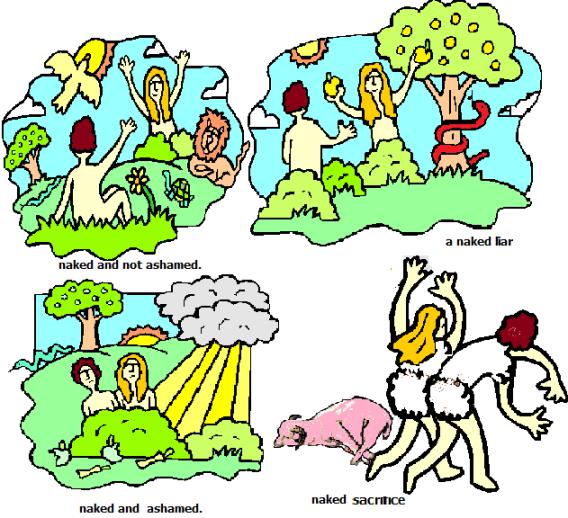THE
BARE-FACED LIAR,
OR
"THE 4 NAKED WORDS'
Shame
entered the Garden of Eden because of sin. There are four different
Hebrew words that could translate into English as "naked". One of the words describes a participants in the scenario
as a naked deceiver. He's the proverbial "bald-faced liar."
God created man and wife
in the beginning and they were naked without being ashamed
(Genesis 2:25).
 FIRST
"NAKED": `AROWMH6174.
The Hebrew word
translated into English as "naked" in verse 25 is the
adjective `arowmH6174
and according to Mikelson's
means "nude, either partially or totally" being a word
derived from the root `aramH6191
"in its original sense." The original sense of `aramH6191
is "(properly) to be (or make) bare." With verse 25, this
chapter ends on this positive outlook for the humans. But this
`aramH6191
has a secondary meaning which is dark and ominous and it is used in
the next verse.
FIRST
"NAKED": `AROWMH6174.
The Hebrew word
translated into English as "naked" in verse 25 is the
adjective `arowmH6174
and according to Mikelson's
means "nude, either partially or totally" being a word
derived from the root `aramH6191
"in its original sense." The original sense of `aramH6191
is "(properly) to be (or make) bare." With verse 25, this
chapter ends on this positive outlook for the humans. But this
`aramH6191
has a secondary meaning which is dark and ominous and it is used in
the next verse.
CHANGE
OF SCENE.
To the Hebrew reader the very next verse would be a warning to what
was coming. The serpent
appears as the more subtle
('aruwmH6175)
than any beast of the field. "Now
the serpent was more subtil
than any
beast of the field which the LORD God had made."
'AruwmH6175
according to Mickelson's means "cunning (usually in a bad
sense)." This word is also from `aramH6191
but from
its dark derived meaning "used only in the derivative sense 'to
be cunning' (usually in a bad sense):--X 'very, beware, take crafty
(counsel), be prudent, deal subtilly.'" We understand from
later Scripture that this beast is being used as an instrument for
the Devil, called also the Dragon. Perhaps that's why subtle is a
passive participle
in the Hebrew. ("Passive" suggests that the serpent is not
doing the acting but is being acted upon; i.e., "used").
SECOND:
"NAKED"
LIAR.
Americans have an idiom that appears to mean about the same thing.
Someone is accused of being "a bald-faced liar." This
expression has developed from the British "bare-faced liar"
originating during the Middle Ages. It meant one who originally had
the face uncovered, and hence was figuratively acting in an
unconcealed or open way. Shakespeare used it in both literal and
figurative senses. "From the latter part of the seventeenth
century onwards, it took on a sense of something or someone who was
audacious, shameless or impudent, so that a barefaced lie was one in
which the speaker made no attempt to disguise it as truth." i
The serpent, hence, was a "naked-faced liar."
A
THIRD "NAKED."
Having
sinned, the wife and husband are frightened and are now ashamed that
they are naked.
The word
"naked" is different, ‛eyrom
‛eromH5903
, which is also from the root `aramH6191
.
It's not exactly the same word that was used to describe them before
their fall by sin. John Wesley in his commentary suggested that it
meant that they knew they had lost everything; i.e., they were now
"stripped naked" of the blessings of Creation.
A
FOURTH "NAKED."
Our
merciful God strips the hide of an animal and makes a temporary but
acceptable covering for Adam and Eve. The word "skins" of
3:21 is oreH5785
which Strong
interprets as "skin (as naked); by implication
hide, leather: - hide, leather, skin." OreH5785
is from
its root: `uwrH5783
" 1. to (be) bare- be made naked."
The animals began the offering of animal sacrifices that looked
forward to God's Son being made naked for us in God's plan of
redemption.
Abel's
offering was more pleasing to God because he offered a lamb by faith.
God had shown the parents what he would accept for a covering for
their nakedness. Cain ignored it and offered plants that had already
been rejected. The
crucifixion of the Lamb of God and the consequent building of
Christ's church (Matthew 16:18) was not an afterthought, but was in
God's mind from the beginning (Ephesians 3:10, 11).
Before the conception
of the world God had planned for man's redemption (Ephesians 1:4) by
the death of Jesus to cover the nakedness of sins. For without the
shedding of blood, there is no remission.
Gaylon West
www.BibleStudyLessons.net
Throw Out the Lifeline
i
http://www.worldwidewords.org/qa/qa-bal2.htm. Accessed 5/9/2014.
 FIRST
"NAKED": `AROWMH6174.
The Hebrew word
translated into English as "naked" in verse 25 is the
adjective `arowmH6174
and according to Mikelson's
means "nude, either partially or totally" being a word
derived from the root `aramH6191
"in its original sense." The original sense of `aramH6191
is "(properly) to be (or make) bare." With verse 25, this
chapter ends on this positive outlook for the humans. But this
`aramH6191
has a secondary meaning which is dark and ominous and it is used in
the next verse.
FIRST
"NAKED": `AROWMH6174.
The Hebrew word
translated into English as "naked" in verse 25 is the
adjective `arowmH6174
and according to Mikelson's
means "nude, either partially or totally" being a word
derived from the root `aramH6191
"in its original sense." The original sense of `aramH6191
is "(properly) to be (or make) bare." With verse 25, this
chapter ends on this positive outlook for the humans. But this
`aramH6191
has a secondary meaning which is dark and ominous and it is used in
the next verse.
